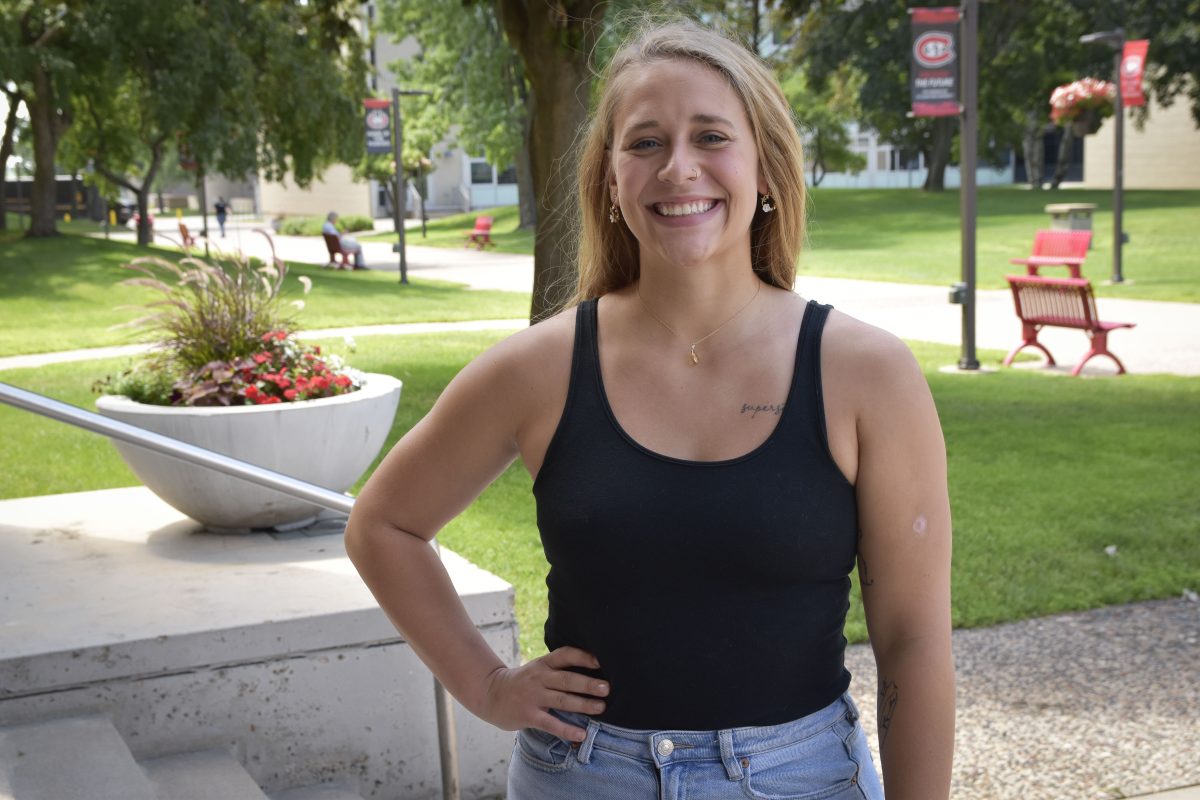
According to the syllabus, the assignment comes down to this: Complete a thesis project which adheres to the guidelines presented herein. Students will develop a hypothesis, review literature, design a research study, collect data, and report the results in a formal written thesis.
Senior Criminal Justice Studies student Vanessa Deerberg did all of that and more when she looked into military sexual trauma which is a tricky topic to tackle.
Deerberg, inspired by her own experience with military sexual trauma (MST), was at a bit of a road block at the start of her thesis. The idea of writing a thesis on MST was strong, but lacked foundation and viable research methods. “Dr. Vigesaa helped me every step of the way,” she said.
Vigesaa guided Deerberg to the Institutional Review Board (IRB) approval process where she could collect original data from human subjects.
According to the St. Cloud State IRB website, IRB is required for research projects defined as a “systematic investigation, including research development, testing, and evaluation, designed to develop or contribute to generalizable knowledge that requires collection of data from human subjects.”
As an IRB-approved researcher, Deerberg completed the required Collaborative Institutional Training Initiative (CITI training), submitted supporting materials to her study and eagerly waited to be approved by a three-step review process.
Seeking to understand the barriers victims face when considering whether or not to report an incident of sexual harassment, sexual assault, or rape, Deerberg tapped into her military community via a social media group. Here she reached 70 current and prior members of the U.S. Armed Forces who completed an anonymous survey.
Survey results showed 66% of survey respondents received uninvited or unwanted sexual attention with 79% of females and 35% of males reporting “yes” to uninvited or unwanted sexual attention.
One hundred percent of the time, participants who reported being a victim of MST also reported the perpetrator was also a member of the U.S. Armed Forces.
Deerberg’s thesis study also looked into how participants evaluated the U.S. military’s Sexual Harassment/Assault Response and Prevention (SHARP) program. The program, designed to be a proactive effort to end sexual harassment and assault, was seen by respondents as “somewhat” beneficial.
| Learn More |
| SHARP |
| St. Cloud State’s IRB approval process |
| Department of Criminal Justice |
| Veterans Resource Center |
Vigesaa applauds Deerberg’s thesis because the data was collected in an area where there is a great need for research and few published studies. She notes researchers on this topic often have difficulty obtaining data on self-reported abuse in the military, but Deerberg had an advantage with the social media group.
When asked if fear of rank and superiors influences a soldier’s comfort level when considering whether or not to report an incident, a person responded, “If the offender is well liked, the victim is usually labeled as overreacting.”
“I think most people do not report because of this. They want a career in the military and think that this will hinder them from continuing, especially if it happened with a higher ranking soldier,” another respondent added.
Responses were raw, candid, and provided an uncensored platform for servicemen and women to speak their mind. From those responses, Deerberg noticed recurring themes of unapproachable leadership, fear of rank, and suggestions on how SHARP can make changes to combat the occurrence of MST.
This is the tip of the iceberg for Deerberg and she sees SHARP as an area to research further. Respondents’ suggestions for SHARP improvement ranged from more personal stories being told to building trust within units to a zero tolerance policy to illustrate MST is being taken seriously.
“This is where we can start making changes to truly combat the occurrence of such incidents, she said. “It is easy to recognize a problem, but much harder to determine what changes can be made to truly make a difference.”
Deerberg, a Milaca, Minnesota native, enlisted in the U.S. Military in January of 2019. Today, she is a SPC/E4 Military Police officer and a 2022 graduate of St. Cloud State University with a degree in Criminal Justice Studies. She will attend the St. Thomas School of Law in the fall.
